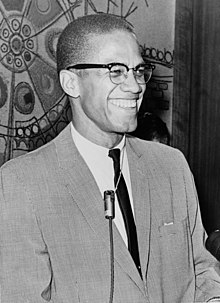Malcolm X
| Malcolm X | |
|---|---|

Malcolm X in March 1964
|
|
| Born |
Malcolm Little May 19, 1925 Omaha, Nebraska |
| Died | February 21, 1965 (aged 39) Manhattan, New York |
| Cause of death | Assassination (multiple gunshots) |
| Resting place | Ferncliff Cemetery |
| Other names | el-Hajj Malik el-Shabazz (الحاجّ مالك الشباز) |
| Occupation | Minister, activist |
| Organization |
Nation of Islam, Muslim Mosque, Inc., Organization of Afro-American Unity |
| Movement |
Black nationalism, Pan-Africanism |
| Spouse(s) | Betty Shabazz (m. 1958–65) |
| Children |
Attallah Shabazz Qubilah Shabazz Ilyasah Shabazz Gamilah Lumumba Shabazz Malikah Shabazz Malaak Shabazz |
| Parent(s) | Earl Little Louise Helen Norton Little |
| Signature | |
 |
|
|
|
Malcolm X (/ˈmælkəm ˈɛks/; May 19, 1925 – February 21, 1965), born Malcolm Little and later also known as el-Hajj Malik el-Shabazz (Arabic: الحاجّ مالك الشباز), was an African-American Muslim minister and human rights activist. To his admirers he was a courageous advocate for the rights of blacks, a man who indicted white America in the harshest terms for its crimes against black Americans; detractors accused him of preaching racism and violence. He has been called one of the greatest and most influential African Americans in history.
Malcolm X was effectively orphaned early in life. His father was killed when he was six and his mother was placed in a mental hospital when he was thirteen, after which he lived in a series of foster homes. In 1946, at age 20, he went to prison for larceny and breaking and entering. While in prison, Malcolm X became a member of the Nation of Islam, and after his parole in 1952, quickly rose to become one of the organization's most influential leaders. He served as the public face of the controversial group for a dozen years. In his autobiography, Malcolm X wrote proudly of some of the social achievements the Nation made while he was a member, particularly its free drug rehabilitation program. The Nation promoted black supremacy, advocated the separation of black and white Americans, and rejected the civil rights movement for its emphasis on integration.
...
Wikipedia
